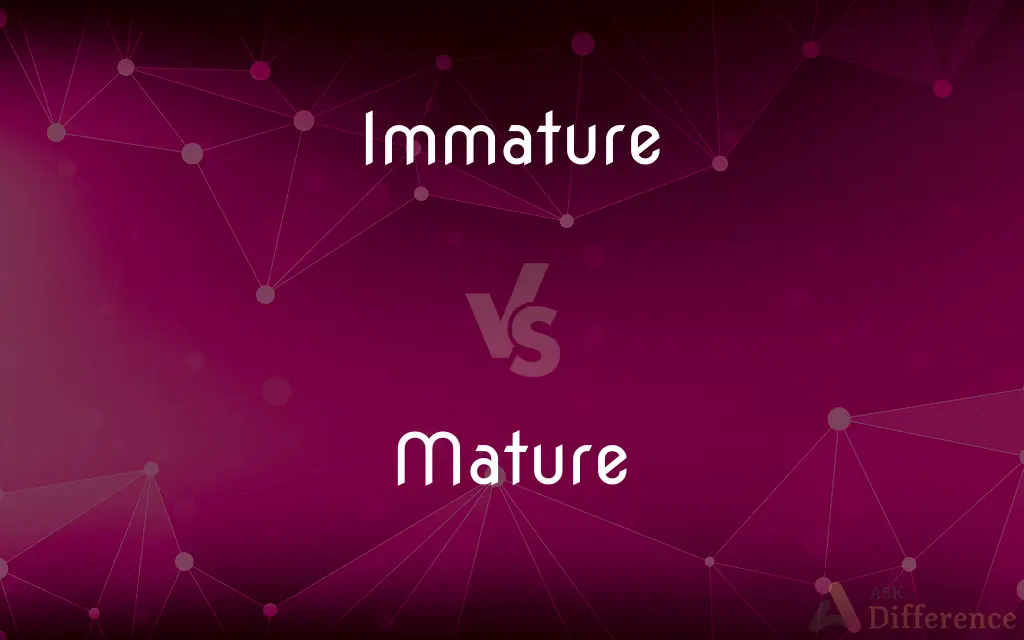Immature vs. Mature — What's the Difference?
By Tayyaba Rehman & Urooj Arif — Published on February 9, 2024
Immature refers to lacking full development or experience, while Mature implies fully developed physically or mentally, showing wisdom or emotional restraint.

Difference Between Immature and Mature
Table of Contents
ADVERTISEMENT
Key Differences
Immature individuals often react to situations based on impulse or immediate emotions, lacking foresight or consideration for consequences. In contrast, Mature individuals tend to respond to situations with thoughtfulness, considering long-term effects and the feelings of others. This distinction highlights the depth of emotional regulation and foresight between the two.
Immature behavior is characterized by a need for instant gratification, without much thought for future implications. Mature individuals, however, understand the value of patience and delayed gratification, recognizing that some outcomes require time and perseverance.
In terms of responsibility, Immature individuals might shirk duties or obligations, viewing them as burdensome. Mature individuals, on the other hand, embrace responsibilities as part of personal growth and societal contribution, understanding their importance in the broader context of life.
When faced with challenges, Immature individuals may quickly give up or avoid confronting the issue, showing a lack of resilience. Conversely, Mature individuals approach obstacles with determination and a problem-solving mindset, viewing challenges as opportunities to learn and grow.
In social interactions, Immature individuals may prioritize their own needs and desires, sometimes at the expense of others. Mature individuals, however, exhibit empathy and consideration, striving to maintain harmony and understanding within relationships.
ADVERTISEMENT
Comparison Chart
Connotation
Negative, suggesting a lack of development or experience.
Positive, suggesting full development and wisdom.
Usage in Sentences
Often used to describe behavior or emotional state.
Used to describe behavior, emotional state, or physical growth.
Associated Traits
Impulsiveness, dependency, lack of foresight.
Self-reliance, foresight, emotional control.
Grammatical Forms
Can be used as an adjective; "immature behavior."
Can be used as an adjective or noun; "mature judgment."
Evolution of Meaning
Primarily remains consistent, denoting underdevelopment.
Can denote aging or ripening in different contexts.
Compare with Definitions
Immature
Lacking in emotional development
His immature outburst was unexpected.
Mature
Showing emotional or intellectual depth
Her mature perspective was valued by her team.
Immature
Inexperienced or unseasoned
His immature handling of the situation worsened it.
Mature
Ripe or fully aged
The mature cheese had a rich, complex flavor.
Immature
Showing childish behavior
Her immature jokes didn't amuse the adults.
Mature
Thoughtful and considerate
His mature response defused the tense situation.
Immature
Not fully grown or developed
An immature plant.
Mature
Ready or suitable for a purpose
The time is mature for new leadership.
Immature
Marked by or suggesting a lack of normal maturity
Silly, immature behavior.
Mature
Having reached full natural growth or development
A mature cell.
Immature
An immature animal; a juvenile.
Mature
Having reached a desired or final condition; ripe
A mature cheese.
Immature
Occurring before the proper time; untimely, premature (especially of death).
Mature
Worked out fully by the mind; considered
A mature plan of action.
Immature
Not fully formed or developed; not grown.
Mature
Having reached the limit of its time; due
A mature bond.
Immature
Childish in behavior; juvenile.
You're only young once, but you can be immature the rest of your life.
The man was immature for throwing a tantrum.
Mature
No longer subject to great expansion or development. Used of an industry, market, or product.
Immature
An immature member of a species.
Mature
(Geology) Having reached maximum development of form. Used of streams and landforms.
Immature
Not mature; unripe; not arrived at perfection of full development; crude; unfinished; as, immature fruit; immature character; immature plans.
Mature
To bring to full development; ripen.
Immature
Premature; untimely; too early; as, an immature death.
Mature
To work out fully in the mind
"able to digest and mature my thoughts for my own mind only" (John Stuart Mill).
Immature
Characteristic of a lack of maturity;
Immature behavior
Mature
To evolve toward or reach full development
The child's judgment matures as she grows older.
Immature
Lacking in development;
Immature plans
An unformed character
Mature
To become due. Used of notes and bonds.
Immature
(used of living things especially persons) in an early period of life or development or growth;
Young people
Mature
Fully developed; grown up in terms of physical appearance, behaviour or thinking; ripe.
She is quite mature for her age.
The excellent mature eggplants grown in the garden plot are quickly being being picked up by family and friends.
Immature
Not fully developed or mature; not ripe;
Unripe fruit
Fried green tomatoes
Green wood
Mature
Brought to a state of complete readiness.
A mature plan
Immature
Not yet mature
Mature
Profound; careful.
The headmaster decided to expel the boy after a mature consideration.
Immature
(of birds) not yet having developed feathers;
A small unfledged sparrow on the window sill
Mature
Come to, or in a state of, completed suppuration.
Immature
Premature or hasty
Their decision to move in was considered immature by many.
Mature
(intransitive) To proceed toward maturity: full development or completion (either of concrete or of abstract things, e.g. plans, judgments, qualities).
Mature
To attain maturity, to become mature or ripe.
Mature
(transitive) To bring (something) to maturity, full development, or completion.
Mature
(transitive) To make (something, e.g. fruit) ripe or mature.
Mature
To proceed toward or become mature or full-grown, either physically or psychologically; to gain experience or wisdom with age.
Mature
(transitive) To make (someone) mature.
Mature
To reach the date when payment is due.
When the bond matures, the full face value is payable to its bearer.
Mature
Brought by natural process to completeness of growth and development; fitted by growth and development for any function, action, or state, appropriate to its kind; full-grown; ripe.
Now is love mature in ear.
How shall I meet, or how accost, the sage,Unskilled in speech, nor yet mature of age?
Mature
Completely worked out; fully digested or prepared; ready for action; made ready for destined application or use; perfected; as, a mature plan.
This lies glowing, . . . and is almost mature for the violent breaking out.
Mature
Of or pertaining to a condition of full development; as, a man of mature years.
Mature
Come to, or in a state of, completed suppuration.
Mature
To bring or hasten to maturity; to promote ripeness in; to ripen; to complete; as, to mature one's plans.
Mature
To advance toward maturity; to become ripe; as, wine matures by age; the judgment matures by age and experience.
Mature
Hence, to become due, as a note.
Mature
Develop and reach maturity; undergo maturation;
He matured fast
The child grew fast
Mature
Develop and work out fully in one's mind;
I need to mature my thoughts
Mature
Become due for repayment;
These bonds mature in 2005
Mature
Cause to ripen or develop fully;
The sun ripens the fruit
Age matures a good wine
Mature
Grow old or older;
She aged gracefully
We age every day--what a depressing thought!
Young men senesce
Mature
Cause to ripen and discharge pus;
The oil suppurates the pustules
Mature
Characteristic of maturity;
Mature for her age
Mature
Fully considered and perfected;
Mature plans
Mature
Having reached full natural growth or development;
A mature cell
Mature
Fully developed or matured and ready to be eaten or used;
Ripe peaches
Full-bodies mature wines
Mature
(of birds) having developed feathers or plumage; often used in combination
Mature
Fully developed physically
The mature oak tree towered over the house.
Common Curiosities
Can someone be mature at a young age?
Yes, maturity is not solely age-dependent; it can also reflect emotional, intellectual, and experiential development.
What defines immature behavior?
Immature behavior is characterized by impulsiveness, lack of consideration for consequences, and emotional underdevelopment.
Can mature individuals act immaturely?
Yes, even mature individuals may display immaturity under certain circumstances or in specific areas of their lives.
How does one become more mature?
Maturity develops through experiences, self-reflection, learning from mistakes, and understanding and empathizing with others.
Can immaturity affect relationships?
Immaturity can strain relationships due to lack of empathy, understanding, and consideration for others.
Is being immature always negative?
While often viewed negatively, some aspects of immaturity, like playfulness, can be positive in appropriate contexts.
How do you deal with immature people?
Dealing with immature people involves patience, clear communication, setting boundaries, and sometimes guidance.
Is maturity a fixed trait?
Maturity can evolve over time, influenced by life experiences, personal growth, and changes in perspective.
How does culture influence perceptions of maturity?
Cultural values and norms significantly shape what behaviors are considered mature or immature.
Does maturity correlate with age?
Generally, maturity increases with age, but it's not a strict correlation as individual experiences and personalities vary.
Can education influence maturity?
Education can promote maturity by expanding perspectives, encouraging critical thinking, and fostering emotional intelligence.
Do immature individuals recognize their immaturity?
Not always; self-awareness varies, and some may not recognize their immature behaviors or attitudes.
Can maturity be measured?
While there's no standard scale, maturity is often assessed through behaviors, decision-making, and emotional regulation.
Is immaturity a psychological disorder?
Immaturity itself isn't a disorder, but it can be a symptom or characteristic of certain psychological conditions.
Can professional environments influence maturity?
Professional environments can foster maturity by necessitating responsibility, ethical behavior, and collaboration.
Share Your Discovery

Previous Comparison
Hen vs. Pullet
Next Comparison
Christmas vs. HannukahAuthor Spotlight
Written by
Tayyaba RehmanTayyaba Rehman is a distinguished writer, currently serving as a primary contributor to askdifference.com. As a researcher in semantics and etymology, Tayyaba's passion for the complexity of languages and their distinctions has found a perfect home on the platform. Tayyaba delves into the intricacies of language, distinguishing between commonly confused words and phrases, thereby providing clarity for readers worldwide.
Co-written by
Urooj ArifUrooj is a skilled content writer at Ask Difference, known for her exceptional ability to simplify complex topics into engaging and informative content. With a passion for research and a flair for clear, concise writing, she consistently delivers articles that resonate with our diverse audience.













































